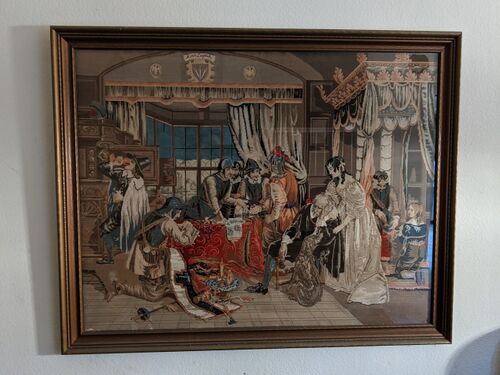Difference between revisions of "The Plundering of Basing House - Needlework"
| Line 3: | Line 3: | ||
This family heirloom,currently in the personal possession of {{has person|Jennifer Louise James|alt=Jennifer Crews}}, is a needlepoint reproduction of [[:File:The Plundering of Basing House - Charles Landseer.jpg|The Plundering of Basing House]] by [https://en.wikipedia.org/wiki/Charles_Landseer Charles Landseer]<ref>{{citation:The Plundering of Basing House - Charles Landseer.jpg/citation listing}}</ref>. Believed to have been completed circa 1852 by {{has person|Josephine Hawes}} when she was about 17 years old.<ref>Citation:The Boston Globe Sun Nov 21 1915 .jpg</ref> | This family heirloom,currently in the personal possession of {{has person|Jennifer Louise James|alt=Jennifer Crews}}, is a needlepoint reproduction of [[:File:The Plundering of Basing House - Charles Landseer.jpg|The Plundering of Basing House]] by [https://en.wikipedia.org/wiki/Charles_Landseer Charles Landseer]<ref>{{citation:The Plundering of Basing House - Charles Landseer.jpg/citation listing}}</ref>. Believed to have been completed circa 1852 by {{has person|Josephine Hawes}} when she was about 17 years old.<ref>Citation:The Boston Globe Sun Nov 21 1915 .jpg</ref> | ||
| − | [[:File:The Plundering of Basing House - Charles Landseer.jpg|The Plundering of Basing House]] is an oil painting on canvas finished sometime prior to 1836 | + | [[:File:The Plundering of Basing House - Charles Landseer.jpg|The Plundering of Basing House]] is an oil painting on canvas finished sometime prior to 1836, and is currently in the possession of the Tate Museum.<ref>https://www.tate.org.uk/art/artworks/landseer-the-plundering-of-basing-house-n00612</ref> The painting depicts the aftermath of the third, and final, engagement of the siege on October 1645 during the [https://en.wikipedia.org/wiki/First_English_Civil_War First English Civil War]. During the engagement Oliver Cromwell breached its defenses on {{has date|October 14, 1645}}. During the assault the House caught fire and was badly damaged. What remained was "totally slighted and demolished" by order of Parliament, with the stones of the House offered free to anyone who would cart them away. <ref>https://en.wikipedia.org/wiki/Siege_of_Basing_House</ref> |
==Known Provenance== | ==Known Provenance== | ||
Latest revision as of 10:33, 16 September 2021

This family heirloom,currently in the personal possession of Jennifer Crews, is a needlepoint reproduction of The Plundering of Basing House by Charles Landseer[1]. Believed to have been completed circa 1852 by Josephine Hawes when she was about 17 years old.[2]
The Plundering of Basing House is an oil painting on canvas finished sometime prior to 1836, and is currently in the possession of the Tate Museum.[3] The painting depicts the aftermath of the third, and final, engagement of the siege on October 1645 during the First English Civil War. During the engagement Oliver Cromwell breached its defenses on 14 October 1645. During the assault the House caught fire and was badly damaged. What remained was "totally slighted and demolished" by order of Parliament, with the stones of the House offered free to anyone who would cart them away. [4]
Known Provenance
Related Documents
- ↑ Citation:The Plundering of Basing House - Charles Landseer.jpg/citation listing
- ↑ Citation:The Boston Globe Sun Nov 21 1915 .jpg
- ↑ https://www.tate.org.uk/art/artworks/landseer-the-plundering-of-basing-house-n00612
- ↑ https://en.wikipedia.org/wiki/Siege_of_Basing_House
- ↑ "Masterpiece of Needlework," The Boston Sunday Globe, 21 November 1915, (http://newspapers.com : accessed 12 Dec 2020), page 4, col 3.; https://www.newspapers.com/image/430895668 Stored locally: File:The Boston Globe Sun Nov 21 1915 .jpg.
- ↑ "Masterpiece of Needlework," The Boston Sunday Globe, 21 November 1915, (http://newspapers.com : accessed 12 Dec 2020), page 4, col 3.; https://www.newspapers.com/image/430895668 Stored locally: File:The Boston Globe Sun Nov 21 1915 .jpg.

